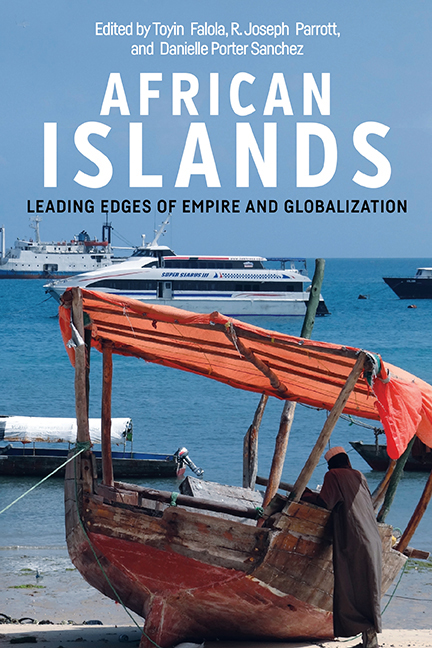Book contents
- Frontmatter
- Dedication
- Contents
- Introduction: Arbiters and Witnesses of Change: Contextualizing Conversations on African Islands
- Part 1 Atlantic Ocean Islands
- 1 The Canaries to Africa: The Atlantic Strategy of “To Be or Not to Be”
- 2 Sugar, Cocoa, and Oil: Economic Success and Failure in São Tomé and Príncipe from the Sixteenth to the Twenty-First Centuries
- 3 The Bijagos of Canhabac Island (Guinea-Bissau)
- 4 An Island in the Middle of Everywhere: Bioko under Colonial Domination
- 5 Cursing in Bioko and Annobón: Repeating Islands that Don't Repeat
- 6 African Ports and Islands during the Second World War
- 7 “Nos lingua, nos kultura, nos identidadi”: Postcolonial Language Planning and Promotion in Cabo Verde and the Cape Verdean Diaspora
- Part 2 Indian Ocean Islands
- Notes on Contributors
- Index
7 - “Nos lingua, nos kultura, nos identidadi”: Postcolonial Language Planning and Promotion in Cabo Verde and the Cape Verdean Diaspora
from Part 1 - Atlantic Ocean Islands
Published online by Cambridge University Press: 31 August 2019
- Frontmatter
- Dedication
- Contents
- Introduction: Arbiters and Witnesses of Change: Contextualizing Conversations on African Islands
- Part 1 Atlantic Ocean Islands
- 1 The Canaries to Africa: The Atlantic Strategy of “To Be or Not to Be”
- 2 Sugar, Cocoa, and Oil: Economic Success and Failure in São Tomé and Príncipe from the Sixteenth to the Twenty-First Centuries
- 3 The Bijagos of Canhabac Island (Guinea-Bissau)
- 4 An Island in the Middle of Everywhere: Bioko under Colonial Domination
- 5 Cursing in Bioko and Annobón: Repeating Islands that Don't Repeat
- 6 African Ports and Islands during the Second World War
- 7 “Nos lingua, nos kultura, nos identidadi”: Postcolonial Language Planning and Promotion in Cabo Verde and the Cape Verdean Diaspora
- Part 2 Indian Ocean Islands
- Notes on Contributors
- Index
Summary
This chapter offers a new appraisal of scholarly and popular representations of Cape Verdean language and culture, taking as its subject promotional and planning activities from Cape Verdean independence in 1975 to the present day. I argue that historical derogatory tropes of degeneracy, inferiority, and impurity applied to Creole cultures have hindered efforts toward language parity between Portuguese—the Republic of Cabo Verde's official colonial language—and Cape Verdean Creole (CVC)—the vernacular of the population. The tropes stem from what noted linguist Michel DeGraff has termed Creole exceptionalism, the widespread and often harmful belief that “Creole languages form an exceptional class on phylogenetic and/or typological grounds.” Drawing on extensive archival and ethnographic research in West Africa, Europe, and North America, I analyze major scholarly, literary, artistic, and legislative developments of each decade, with an eye toward the contributions of cultural activists working to valorize CVC. Interventions in language and cultural planning have been made on three continents by institutions like the Cape Verdean Ministry of Culture, the Mass achusetts Public School System, and the Port uguese Ministry of Education yet remain limited in their efficacy. When these interventions are studied together, it becomes apparent that debates surrounding the promotion of CVC language and culture center on contentious postcolonial political ideologies, complex notions of local versus global identity, and exceptionalist questions of Cabo Verde's “Africanness,” “Portugueseness,” and “Creoleness,” often stalling the reforms of scholars and policy makers and profoundly affecting the life chances of CVC speakers. Throughout, I contend that popular culture, especially literature and music, longtime safe spaces for CVC, have played an integral role in preserving and promoting the language both in Cabo Verde and the diaspora.
The celebration and reclamation of Cape Verdean culture, especially through language, literature, and music, played an essential role in the movement for Cabo Verde's independence from Portugal. As such, authors, lyricists, composers, and performers played an integral part in the promotion of CVC. Following independence, such work multiplied rapidly as a result of government sponsorship, liberation from Portuguese censorship, and the proliferation of educational and printing opportunities. Nonetheless, Manuel Veiga, a leading Cape Verdean linguist and minister of culture from 1999 to 2009, writes: “it must also be recognized that the major fort where CVC resisted the great glottophagic waves were orality and oral traditions.”
- Type
- Chapter
- Information
- African IslandsLeading Edges of Empire and Globalization, pp. 208 - 242Publisher: Boydell & BrewerPrint publication year: 2019



